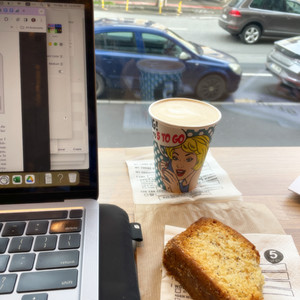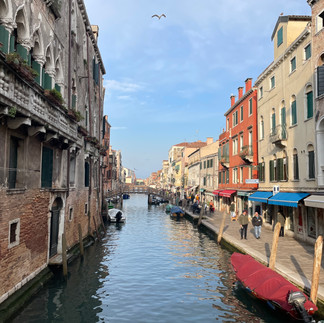Writing Process and Relocating Laundry: Motherscholar Truths Revealed 💁♀️ (bonus Italy pics!)
- Elizabeth Bellows
- May 7, 2024
- 7 min read
I have been especially curious about different theories and methodologies while engaging in my Fulbright research, so I have been playing with ways theory can be enacted as methods. I have been documenting the ways I am paying attention to how I go about doing research as a motherscholar in an international context. Thinking about my research this way is an attempt to normalize mothering as an inescapable part of this particular kind of research, and operates to vulnerably showcase that everyone's work routine is "good." It's whatever gets you through to the next day, to the next project, and keeps you writing, no matter the time between work "products" or the direction your interests and experiences take you. So maybe you'll find this interesting. Otherwise, carry on, la revedere ~ goodbye. ✌🏻😉
Writing Time.
I spent most of February finishing up a piece about United Nations Day, an event the International School celebrated back in October. My mentor looked over the article and gave me some guidance, providing writer me with some familiar and gentle feedback, along with helpful additions and ideas. I felt that inspired graduate student feeling and got the article submitted. I also submitted a couple of NCSS proposals for Boston this year. I touched base with a couple of colleagues--both from my university--about potentially collaborating on projects involving my research. It looks like one will probably work out, and one will probably not. Either way, I feel less and less like I'm on a lonely island now that I have had some academic conversations with folks I admire and trust. I wrote my annual review and had a meeting with my department chair, so it's starting to feel like a gentle entry back into the work space (and I'm earning paychecks again!).
Part of what I'm trying to hash out in my writing is how much I am implementing particular methodological approaches to this research, and how much I am implementing theory as method. Having to write up my IRB for AppState really sent me into a tailspin that allowed me to shed all my preconceived notions about what counts as research, and how to name the type of research I have been doing. I have been reading a lot about this lately--Matias's (2021) Handbook of Critical Theoretical Research Methods in Education as well as ideas like mindful walking as described by Jung (2013), and a notion I'm playing with that I'm calling serendipitous motherscholar community building, though the term does not yet feel comfy to me. Such is writing, I suppose. I'll keep kicking it around in my noggin.
The Writing Process as of Late.
Proposal writing for the annual NCSS and CUFA conferences in Boston this fall is in full swing, so now with the NCSS proposals in, I'm in full-blown thinking/writing mode. I thought it might be helpful for some folks to let you peek behind my writing wizard-curtain to see my secrets. Keep in mind for the first time in 24 years, I am not teaching. No curriculum to follow, course to design, readings to refresh myself on, lessons to prepare, class discussions, reading reflections to grade. I have felt way, way out of the loop. This is definitely a writing blessing. However (emphasis so you read that h-word with weight). I. Am. Still. A. Mama. Here. For some readers (IYKYK), this is all you need. Move on to the next paragraph. For others, just know that identifying as a motherscholar comes with its own unique methods, theories, ways of being, ways of knowing, and ways of researching, and I will continue teasing out these notions in some of my writing about motherscholar research methodologies, specifically in an international context, possibly forthcoming.
I keep coming back to work (to my laptop)--YAY!, and employing my productivity aides: a pomodoro technique timer called Flow (an iMac app; 25 minutes of focused work, 5 minute breaks, longer breaks included also), a daily task list, the Keep app on my iPhone, and Google Drive. Without some kind of time management tool I will sit at the laptop only getting up for potty breaks and coffee, and stray from the work a lot more (social media, planning trips, and paying the bills, for example). So I highly recommend a work session timer app. I also have to set up my work area before I get to work. The venue varies just so I can keep it interesting. I typically sit in my living room recliner with the laptop on my lap and my first cup of coffee, but I eventually move to a more suitable environment for long-term laptop lovin'. For some reason it took YEARS for me to learn that I can set myself up for success and try to hammer out all the things that are tap-tap-tapping on my brain first thing, instead of trying to dive into the deep end and start the harrowing task of writing. I can be ready to write after about 10-20 minutes of "task time." An idea for a proposal I dreamt about? Open a new doc in the Conferences 2024 folder in my Drive and document it there. Email? Delete everything you can. Respond, but only if you can do it quickly. Something to add to the task list? I use the one built in to Google apps. Add new task. Quickly. Look at what was on the list yesterday, last week, what has not yet been done. Do some prioritizing. Make the day's plan.
Fulbright asks us to get our work done on average, 16 days out of each month. I can tell you some months I did not work that many days, and other months I worked more. Whoever came up with this number was realistic, especially for those of us with dependents. The Fulbright organization seems to understand the purpose of this trip is not just to "do research"--it's also to relocate your family to another country and figure out how to get through each day.
After some task deleting and creating, I move to a more permanent location. I like my dining room table with the door open, sometimes the cozy, tiny desk in our tiny bedroom, or at Max's desk in his brightly-lit room. On a cold day I love a good coffee shop with wifi. Today's blog post comes from the rooftop of Klausen Burger rooftop patio on a lovely April afternoon, a view of the city and Piața Muzeului. It's 73 degrees out--who could write indoors today?

Once I'm writing, I'm "in the zone" and I try not to bother myself, but stay with the work sessions and hold to the breaks. I'll close the task list. Stay with the one thing that is creating. Physical 5-minute breaks include a quick snack (handful or 2 of nuts, apple slices, make tea, fresh glass of cold water), and always UP from the seat. It is very important I do not sit down during this time. Be mobile. (In public I just close the laptop and enjoy my beverage.) 5 minutes, then back at it. Once I've deflated my idea balloon, I allow myself to look back at the list. Is my mind craving something else right now? Or would this be a good time for the long break? The long break ALWAYS includes either food (if it's lunch time), yoga, or a walk. I have to be mindful of the time since it takes 30 minutes to walk to school to pick up the kids. This method works for me about 90% of the time. 😆
Relocating laundry and giving grace.
I joked with one of my friends on Zoom the other day that this whole trip has essentially been a process of relocating laundry. We have traveled to Paris, Brașov, Garmish-Partenkirchen, Kunzelsau, Istanbul, Bucharest, Timisoara, Sighișoara, Venice, Florence, and have trips to Sighetu-Marmtiei, Sibiu, London, and another to Bucharest planned before heading back to the states. On every trip, the co-parents must supervise the packing of the four carry-ons, making sure everyone has every THING they require, and making sure the AirBnB we rent has a washing machine. Relocating the laundry. Go, go, go. There was recently an article on EdWeek about how household labor should be a topic of study in social studies, and I am on board with this argument. Women in academia (and hundreds of other professions, I'm sure), typically experience the majority of the responsibilities of household labor while simultaneously working full-time, and sometimes doing their work in the midst of the place where the household labor must occur. Choosing to ignore the academic work is always an option, but even on a "vacation" or "break", the household labor cannot be ignored. And so, at this point in our parenting, we are learning about the invisibility of parenting as household management, and how to give each other (and the kids!) grace when the house is a mess.
Since the weather turned cooler last fall, we have had to dry our laundry on drying racks in our common space (the entryway and as soon as you walk into the living room). So anytime we come or go, we are walking past our exposed, limp, hanging laundry. At first it felt depressing to bear witness to all our wet clothes lifelessly hanging in clear view. But now, probably because the spring birds have started chirping and flowers are blooming all over town, I see the laundry as our opportunity to start each day fresh and clean; to wash yourself off, hang yourself to dry, and in the morning you'll be dry and smell better. :) Later this week it will be warm enough to hang the laundry outside and open the windows, and I know we're all looking forward to getting the dang clothes out of our doorway; until we fold it all up, pack up our bags, and take it with us on our next road trip...
Bonus: Spring in Italy!
We were able to take the kids to Italy (Claire's choice--Max doesn't care where we go), and we decided on Venice. We took a train to and from Florence while we were there, so we packed in as much as we could in four days. We were able to see a performance of Vivaldi's Four Seasons in the church where he composed it, wander the San Marco plaza, Doge's Palace, and take a boat to the Murano and Burano islands. In Venice we saw three Davids, climbed to the top of the Duomo, ate an amazing sandwich, and shopped the leather market (thank you to my Sherry Godmother and Marmi for your generosity). This trip we got to hang our laundry out like true Venetians on a retractable line outside our third floor apartment window. We loathe hotel rooms for this reason: when we stay in an apartment, we actually feel like we live in the city we're visiting. Hotels are stifling. We enjoy discovering what utensils and dishes are available, then finding the nearest grocery store to gather the necessary provisions for cooking the next few nights, and getting to know the neighborhood. Enjoy~ 🇮🇹
Venice
Venice
Florence





























































Great pics! And excellent work, Bellows!!